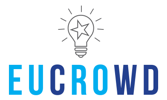Europe for Citizens Programme 2016
Activity: Strand2: Democratic engagement and civic participation
Sub-Activity: Civil society projects
Project time frame: 1 September 2016 – 28 February 2018. Duration in months: 18.
Project budget: 147.750 EUR.
Project identifier: 577356-CITIZ-1-2016-1-SI-CITIZ-CIV.
The European Citizens Crowdsourcing (EUCROWD) project aims to raise awareness of the possibilities and to develop the skills at national and European level for using innovative channels of e-participation of citizens in politics and policy with a focus on the application of crowdsourcing in fostering a democratic debate on the future of the European Union.
The crowdsourcing allows people to participate in a constructive way in debates and to learn from each other throughout the deliberation process (“Wisdom of the crowd” principle). Crowdsourcing legislation is “an open call for anybody to participate in a task open on-line (Brabham, 2008; Howe, 2008) by submitting information, knowledge, or talent. Crowdsourcing has become a popular tool to engage people in processes ranging from urban planning (Brabham, 2010) to new product design and solving complex scientific problems (Aitamurto, Leiponen & Tee, 2011)”.
Crowdsourcing is an open call for the crowd to participate in a policymaking process by submitting their ideas, knowledge or opinions (T. Aitamurto, 2016).
EUCROWD project aims to foster European citizenship and to improve conditions for civic and democratic participation at Union level by gradually transforming the relationship between EU citizens and EU decision-makers into more of a partnership thus contributing to the creation of an engaged citizenship.
Specifically, the project will contribute to citizens’ understanding of the Union policy-making process and encouraging democratic engagement by establishing a framework for an EU level pilot of crowdsourcing on the Future of Europe. The framework will be based on an overview of international crowdsourcing practices, conclusions from conferences organized by project partners, recommendations on both the most suitable policies to be crowdsourced at EU level and the most appropriate e-participation tools to be used. The project targets digital (internet and social media) components of crowdsourcing in Europe by exploring opportunities of e-platforms for collaboration and other new-tech approaches that are going beyond usual consultations and structured dialogue.
Focus will be on opportunities for expanding the number of contributors to the EU policy making, removing potential barriers to participation that translate into a general feeling of exclusion from mainstream forms of influencing EU decision-making and “engaging the unengaged” throughout Europe. The project will also identify, map and network influencers, drivers and promoters of crowdsourcing as an innovative deliberative method of e-participation.
The target groups in focus of this project are citizens, youth, NGOs, activists, experts, academia, opinion makers, media, politicians and government officials interested in citizenship, democracy and internet as well in public issues and polices at national and the EU level.
